Top 10 Foods Highest in Tryptophan
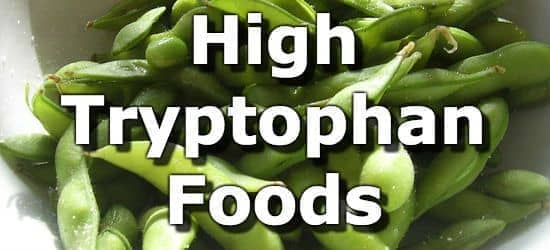
Tryptophan is an essential amino acid needed for general growth and development, the production of niacin (vitamin B3), and the neurotransmitter serotonin. Serotonin is believed to play an important role in regulating sleep and mood, which is why turkey is sometimes attributed to making people sleepy. The truth, however, is that many other foods contain as much tryptophan as turkey and do not cause drowsiness.
High tryptophan foods include chicken, turkey, red meat, pork, tofu, fish, beans, milk, nuts, seeds, oatmeal, and eggs. The reference dietary intake (RDI) for tryptophan is 4mg per kilogram of body weight or 1.8mg per pound. Therefore, a person weighing 70kg (~154 pounds) should consume around 280mg of tryptophan per day.
Below is a list of the top 10 foods highest in tryptophan with the %RDI calculated for someone weighting 70kg (154lbs). For more high tryptophan foods see the extended list of tryptophan rich foods.
List of High Tryptophan Foods
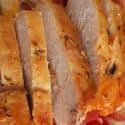 1 Lean Chicken & Turkey
1 Lean Chicken & Turkey| Tryptophan in a 6oz Chicken Breast | Tryptophan per 100g | Tryptophan per 200 Calories |
|---|---|---|
| 687mg (245% RDI) | 404mg (144% RDI) | 515mg (184% RDI) |
More Poultry High in Tryptophan
- 219% RDI (612mg) per 6oz of ground turkey
- 181% RDI (507mg) per cup of roast chicken
- 174% RDI (488mg) per 6oz roast turkey breast
- 164% RDI (458mg) per cup of chopped roast duck
- 97% RDI (273mg) in 3oz of turkey drumstick
- 94% RDI (264mg) in a single chicken leg (drumstick)
See all meats high in tryptophan.
 2 Beef (Skirt Steak)
2 Beef (Skirt Steak)| Tryptophan per 6oz Steak | Tryptophan per 100g | Tryptophan per 200 Calories |
|---|---|---|
| 636mg (227% RDI) | 374mg (134% RDI) | 279mg (100% RDI) |
More Lean Red Meat High in Tryptophan
- 126% RDI (353mg) per 3oz serving of roast lamb
- 113% RDI (316mg) per 3oz of beef stew (chuck)
- 64% RDI (180mg) per 3oz buffalo sirloin steak
- 41% RDI (114mg) per 3oz hamburger patty (97% lean)
See all meats high in tryptophan.
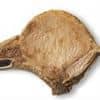 3 Lean Pork Chops
3 Lean Pork Chops| Tryptophan in a 6oz Chop | Tryptophan per 100g | Tryptophan per 200 Calories |
|---|---|---|
| 627mg (224% RDI) | 369mg (132% RDI) | 378mg (135% RDI) |
More Pork Products High in Tryptophan
- 180% RDI (507mg) per cup of diced roast ham
- 136% RDI (380mg) per rack of pork ribs
- 115% RDI (323mg) per 3oz of roast boar
- 105%RDI (295mg) per bratwurst sausage
- 52%RDI (147mg) in 3 slices of bacon
See all meats high in tryptophan.
 4 Firm Tofu
4 Firm Tofu| Tryptophan per Cup | Tryptophan per 100g | Tryptophan per 200 Calories |
|---|---|---|
| 592mg (212% RDI) | 235mg (84% RDI) | 326mg (117% RDI) |
More Soy Foods High in Tryptophan
- 66% RDI (184mg) per 16oz glass of soy milk
- 40% RDI (111mg) per cup of sprouted soybeans
- 115% RDI (322mg) per cup of tempeh
 5 Fish (Salmon)
5 Fish (Salmon)| Tryptophan per 6oz Fillet | Tryptophan per 100g | Tryptophan per 200 Calories |
|---|---|---|
| 570mg (203% RDI) | 335mg (120% RDI) | 429mg (153% RDI) |
More Fish High in Tryptophan
- 203% RDI (570mg) per 6oz tuna fillet
- 179% RDI (500mg) per 6oz snapper fillet
- 165% RDI (461mg) per 6oz cod fillet
- 161% RDI (451mg) per 6oz tilapia fillet
- 151% RDI (423mg) per 6oz mahi mahi fillet
See all fish high in tryptophan.
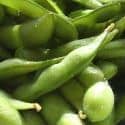 6 Boiled Soybeans (Edamame)
6 Boiled Soybeans (Edamame)| Tryptophan per Cup | Tryptophan per 100g | Tryptophan per 200 Calories |
|---|---|---|
| 416mg (149% RDI) | 242mg (86% RDI) | 281mg (100% RDI) |
More Cooked Legumes High in Tryptophan
- 74% RDI (206mg) per cup of large white beans
- 71% RDI (198mg) per cup of red kidney beans
- 66% RDI (185mg) per cup of pinto beans
- 65% RDI (181mg) per cup of black beans
- 57% RDI (160mg) per cup of lentils
See all beans high in tryptophan.
 7 Milk
7 Milk| Tryptophan per 16oz Glass | Tryptophan per 100g | Tryptophan per 200 Calories |
|---|---|---|
| 211mg (75% RDI) | 43mg (15% RDI) | 253mg (90% RDI) |
More Dairy Products High in Tryptophan
- 59% RDI (166mg) in 1/4cup of Cottage Cheese
- 56% RDI (156mg) per oz of hard mozzarella
- 55% RDI (155mg) per oz of cheddar cheese
- 49% RDI (137mg) per oz of parmesan
- 43% RDI (120mg) per oz of gruyere
- 26% RDI (74mg) per 8oz cup of yogurt
See all dairy products high in tryptophan.
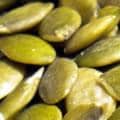 8 Squash and Pumpkin Seeds
8 Squash and Pumpkin Seeds| Tryptophan per 1oz Handful | Tryptophan per 100g | Tryptophan per 200 Calories |
|---|---|---|
| 164mg (58% RDI) | 576mg (206% RDI) | 206mg (74% RDI) |
More Nuts and Seeds High in Tryptophan
- 44% RDI (124mg) per oz of chia seeds
- 30% RDI (84mg) per oz of flax seeds
- 27% RDI (75mg) per oz of cashews
- 27% RDI (74mg) per oz of pistachios
- 23% RDI (65mg) per oz of peanuts
See all nuts and seeds high in tryptophan.
 9 Oatmeal
9 Oatmeal| Tryptophan per Cup | Tryptophan per 100g | Tryptophan per 200 Calories |
|---|---|---|
| 94mg (33% RDI) | 40mg (14% RDI) | 113mg (40% RDI) |
More Cooked Whole Grains High in Tryptophan
- 37% RDI (103mg) per cup of teff
- 34% RDI (96mg) per cup of quinoa
- 32% RDI (90mg) per cup of whole wheat pasta
- 21% RDI (59mg) per cup of brown rice
- 8% RDI (23mg) per cup of corn meal
See all grains high in tryptophan.
 10 Eggs
10 Eggs| Tryptophan in 1 Large Egg | Tryptophan per 100g | Tryptophan per 200 Calories |
|---|---|---|
| 77mg (27% RDI) | 153mg (55% RDI) | 197mg (71% RDI) |
- 109% RDI (306mg) per cup of scrambled eggs
- 15% RDI (41mg) in an egg white
Printable One Page Sheet
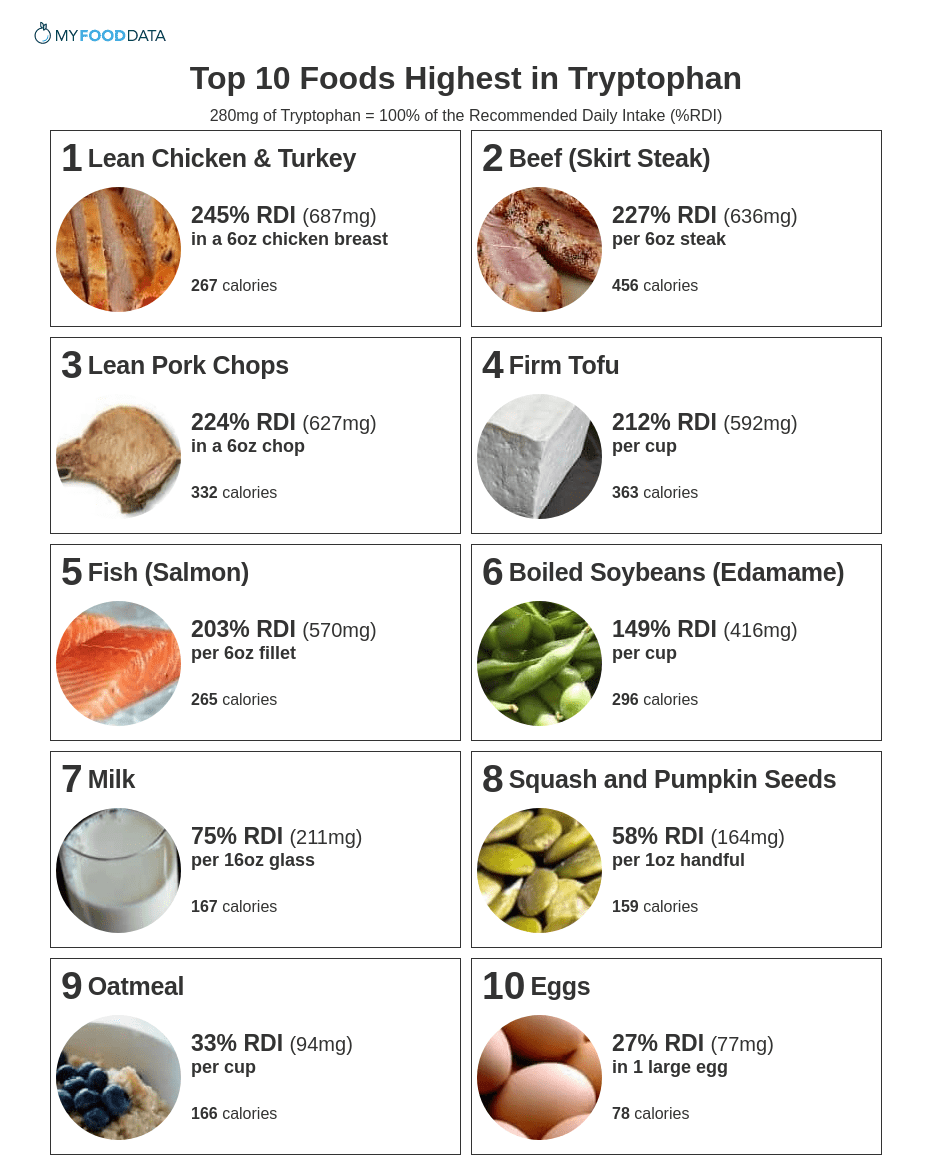
Extended list of Tryptophan Rich Foods
| Food | Serving | Tryptophan |
|---|---|---|
| 1 Canned Sardines | per cup | 147% RDI (411mg) |
| 2 Lobster | per 3oz | 112% RDI (313mg) |
| 3 Snow Crab (Queen Crab) | per 3oz | 100% RDI (281mg) |
| 4 Oysters | per 3oz | 64% RDI (180mg) |
| 5 Sweet Italian Sausage | per 3oz link | 33% RDI (93mg) |
| 6 Sweet Potatoes | per cup mashed | 33% RDI (92mg) |
| 7 Bulgur | per cup cooked | 31% RDI (87mg) |
| 8 Mamey Sapote | per cup pieces | 31% RDI (86mg) |
| 9 Liverwurst Spread | per 1/4 cup | 30% RDI (83mg) |
| 10 Soba Noodles (Buckwheat) | per cup cooked | 29% RDI (82mg) |
| 11 Couscous | per cup cooked | 27% RDI (77mg) |
| 12 Smooth Peanut Butter | in 2 tblsp | 26% RDI (74mg) |
| 13 Spinach | per cup cooked | 26% RDI (72mg) |
| 14 Green Peas | per cup cooked | 21% RDI (59mg) |
| 15 Portobellos | per cup sliced | 20% RDI (57mg) |
| 16 Broccoli | per cup cooked (chopped) | 19% RDI (53mg) |
| 17 Avocados | per avocado | 18% RDI (50mg) |
| 18 Guavas | per cup | 13% RDI (36mg) |
| 19 Turnip Greens | per cup cooked | 10% RDI (29mg) |
| 20 Cocoa Powder | per tblsp | 6% RDI (16mg) |
Tryptophan and Thyroid Function
Does tryptophan inhibit thyroid function? This preliminary study concludes: "...our findings indicate that the inhibition of the in vitro peroxidase activity of some amino acids may be produced by their interaction with the oxidized form of iodide and/or with the iodide site on the TPO molecule. Further studies are needed to define a possible physiological role for amino acids in thyroid gland regulation."
The study particularly notes that cystine, methionine, and tryptophan may affect thyroid function. That said, this study was done in vitro with tissue samples and did not measure the effect of amino acids on thyroid function in living animals or people. This means there is a long way to go to establish more of a link between amino acids and thyroid function.
If you are looking to restrict tryptophan in your diet, you can use the nutrient ranking tool to see a list of foods low in tryptophan.
You can also use the amino acid calculator to see the total amino acids in any meal.
About the Data
Data for the curated food lists comes from the USDA Food Data Central Repository.
You can check our data against the USDA by clicking the (Source) link at the bottom of each food listing.
Note: When checking data please be sure the serving sizes are the same. In the rare case you find any difference, please contact us and we will fix it right away.
About Nutrient Targets
Setting targets can provide a guide to healthy eating.
Some of the most popular targets include:- Daily Value (%DV) - The daily value (%DV) is a general guideline for consumption that will prevent deficiency of a particular nutrient in most people. The %DV refers to the percentage of an amount that's found in a single serving of a food. It also accounts for absorption factors. It is set by the U.S. FDA.
- Recommended Dietary Allowance (%RDA) - The RDA sets an average daily dietary intake level that is sufficient to meet the nutrient requirements of nearly all (97.5%) healthy individuals. It's more specific than the daily value, and varies by age and gender. The RDA is set by the US National Instutites of Health.
- Reference Dietary Intake (%RDI) -The reference dietary intake is similar to the recommended daily allowance, but is specific to age and gender. The RDI for amino acids is set by the U.N. World Health Organization.
- Adequate Intake (%AI) - This value is primarily used in reference to omega-3 and omega-6 fats. The Adequate Intake is set by the U.S. Institute of Medicine. Because there is less evidence to determine the ideal targets for consumption of these nutrients, the specific amount is considered to be less reliable. Using the term Adequate Intake, rather than one of the other terms, helps to emphasize that the ideal intake of that particular nutrient has not yet been scientifically determined.
See the Guide to Recommended Daily Intakes for more information.
Want to set your own targets? Sign up for an account and set custom targets in the daily meal planner.From the Nutrient Ranking Tool
Use the ranking tool links below to select foods and create your own food list to share or print.
- Foods High in Tryptophan
- Foods Low in Tryptophan
- Vegetables High in Tryptophan
- Fruits High in Tryptophan
- Vegetarian Foods High in Tryptophan
- Nuts High in Tryptophan
- Grains High in Tryptophan
- Beans High in Tryptophan
- Dairy High in Tryptophan
- Breakfast Cereals High in Tryptophan
- Fast Foods High in Tryptophan
View more nutrients with the nutrient ranking tool, or see ratios with the nutrient ratio tool.
Related
Data Sources and References
Try the recipe nutrition calculator, or daily meal planner.
Create a free account to log and track foods.
